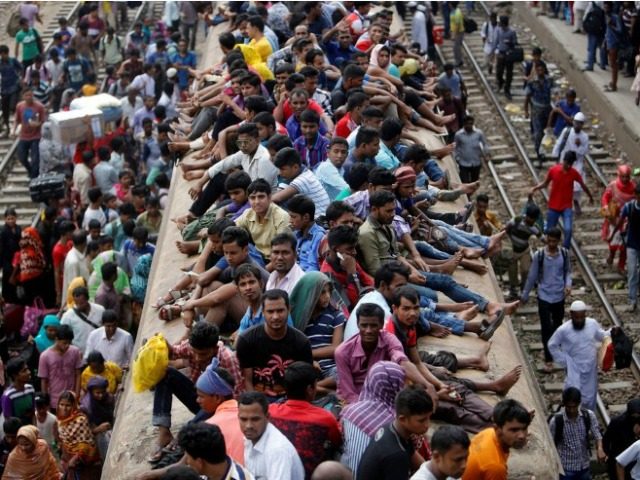For some Syrian refugees in Turkey – who find themselves hopeless, fearful, and concerned about their prospects and that of their family back in Syria – an end to their current predicament seems unattainable save for a return home for Eid al-Adha, one of the most important festivals on the Islamic calendar.
Violence did not stop to observe Eid al-Adha, which marks the end of the Hajj pilgrimage to Mecca. People continued to be killed and maimed during the first day of the festival and the carnage will likely continue through the four-day holiday. Tradition dictates that Muslims slaughter an animal and symbolically shoot at Satan during the festival.
The jihadists appear to have exercised that tradition in their own way: they are slaughtering people and really shooting at those they consider either linked to or Satan himself, all in the name of Allah.
Vocativ notes:
As Muslims celebrate one of the biggest holidays on their religious calendar on Monday, thousands of Syrians took to Facebook to highlight how, for those living in the war-torn country, a day of celebration is overshadowed by violence.
….
Many Syrians, and Syrian refugees chose to commemorate the holiday by sharing photographs depicting deceased and injured children, and other images of bloodshed and destruction. Vocativ discovered thousands of users on Facebook, including on Syrian refugee groups, sharing posts about the war-torn nation, often using the phrase: ‘This is the Eid in Syria.’

A Syrian woman prays at her son’s graveyard in Douma, Syria, Monday. — AFP/Getty Images
The jihadists perpetrating the majority of the terror attacks across the world claim to strictly follow Islam, the religion of peace. With these actions, that is a tough message to sell. It is doubtful that they even care.
Meanwhile, U.S. President Barack Obama, in observance of the holiday, said the United States is committed to being welcoming “with empathy and an open heart—from the refugee who flees war-torn lands to the immigrant who leaves home in search of a better life.”
As millions of Muslims across the world prepare to celebrate Eid al-Adha, violence rages in Syria. https://t.co/8Raj3DIUvA
— Luis A. Garcia (@Luis3RG) September 11, 2016
Violence in #Syria rises after ceasefire for Eid al-Adha did little to quell violence. Below: Rebels flee fr/ sniper. pic.twitter.com/YUJ6xllx
— Foreign Policy Assoc (@FPA_ORG) October 31, 2012
However, it appears that at least some Syrian refugees would rather return home and are willing to take a risk to be reunited with their loved ones.
“It’s always better to be there,” one refugee woman told France 24, on condition of anonymity, according to Hurriyet Daily News. “In Syria we are with family, with neighbors, and it makes Eid really joyful.”
Speaking to France 24, some Syrian refugees expressed their hopes and fears about returning to their native country.
Hurriyet points out:
The crossing [from Turkey into Syria] is only possible from one border crossing, some 50 kilometers from the cities of Aleppo and Idlib.
Taking place at the start of a fragile ceasefire, many remain pessimistic about the prospects for peace in their war-torn homeland.
Hours after the cessation of hostilities was announced, and soon after it was implemented, the warring parties violated the ceasefire. Russian and Iran-backed forces loyal to Syrian dictator Bashar al-Assad were accused of bombing their enemies.
The Russia and United States-brokered ceasefire, which began Monday, is expected to last seven days.
“These ceasefires, we’ve had them for four years, it’s not new,” one man told France 24.
In the meantime, Reuters reports:
Muslims around the world celebrated the Eid al-Adha holiday on Monday, one of the two most important festivals of the Islamic calendar.
Marking the willingness of Ibrahim, or Abraham, to sacrifice his son on God’s command, Muslims mark the holiday by slaughtering animals such as sheep and goats. The meat is shared among family and friends and also donated to the poor.
Faithful across continents marked the festival which comes as the annual Haj pilgrimage to Mecca in Saudi Arabia draws to a close.
Pilgrims were able to cast stones at a pillars symbolizing Satan on Friday during a last rite that marks the end of the annual Hajj pilgrimage to Mecca and the beginning of Eid al-Adha, one of the two most important festivals in the Islamic calendar.
Unfortunately, the festival, particularly the stone-casting ritual known as Jamarat, has been the scene of panic, which has killed hundreds in the recent past.
The festival is aimed at commemorating what Muslims believe was Prophet Abraham’s willingness to sacrifice his son Ismail — the biblical Ishmael. Christians and Jews believe Abraham was commanded to sacrifice his other son, Isaac, as God tested his faith.
“Eid happens twice a year – once at the end of Ramadan and once at the end of Hajj, which marks Eid al-Adha,” The Times of Israel points out. “Also known as the ‘festival of sacrifice,’ Eid al-Adha is considered to be the holier of the two.”

COMMENTS
Please let us know if you're having issues with commenting.